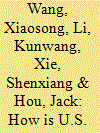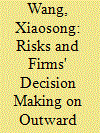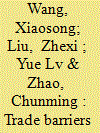|
|
|
Sort Order |
|
|
|
Items / Page
|
|
|
|
|
|
|
| Srl | Item |
| 1 |
ID:
124542


|
|
|
|
|
| Publication |
2013.
|
| Summary/Abstract |
Utilizing a political economy approach towards trade policy formulation, we examine the case of how the U.S. House voted on the PNTR status for China. Our focus is to analyze the factors affecting the legislators' voting behavior and to deduce the rationale behind these factors. We find that the U.S. trade policies towards China represent a balanced equilibrium based on interactions between the government and special interest groups. The individual characteristics of the legislators were not important in the process. Predictions of neo-classical trade models regarding the attitudes of various groups on trade liberalization could not be fully validated in the voting outcome of the PNTR bill.
|
|
|
|
|
|
|
|
|
|
|
|
|
|
|
|
| 2 |
ID:
190159


|
|
|
|
|
| Summary/Abstract |
This study explored how the risks encountered by Chinese state-owned enterprises (SOEs) affected their decision-making on outward foreign direct investment (OFDI), using data regarding the relationship between the host countries and China. The following conclusions were drawn. Larger SOEs with fixed capital exhibited a higher probability of conducting OFDI and did so on a larger scale. Various risks in host countries significantly hindered the OFDI of Chinese SOEs. In pursuit of natural resources, Chinese SOEs chose to take risks. The amount of OFDI by SOEs was positively related to the political, economic, and geographical relations between China and the corresponding host country.
|
|
|
|
|
|
|
|
|
|
|
|
|
|
|
|
| 3 |
ID:
164728


|
|
|
|
|
| Summary/Abstract |
This paper investigates the effects of trade barriers on China's participation in the global value chain (GVC) using a thorough decomposition approach for trade volume, total exports, final exports and intermediate exports. Our econometric results indicate that anti‐dumping (AD) measures initiated by trade partners have restrained the process of China's participation in the GVC. From 2000 to 2014, AD measures reduced the foreign value‐added rate of total, final and intermediate exports by 4.5 to 28.7 percent, 3.4 to 17 percent and 1.2 to 8.5 percent, respectively. In addition, suffering the effects of AD measures, China's GVC position index declined by 8.2 percent to 28.6 percent during this period. Moreover, AD measures have increased industries' upstream index by 3.2 to 13.7 percent over the same period. These results imply that both the petition and approval of AD cases has had a negative influence on the extent and position of China's GVC participation.
|
|
|
|
|
|
|
|
|
|
|
|
|
|
|
|
| 4 |
ID:
148696


|
|
|
|
|
| Summary/Abstract |
This paper offers a comprehensive analysis of the reasons for the large number of trade remedy actions taken against China. Using a multi-country and multi-industry dataset, the present paper shows that the macroeconomic situation of China's partners has a great influence on the probability of trade frictions arising with China. Moreover, the more powerful the industry is, the more likely it is to take trade remedy actions against China. The empirical results reveal that China has been hurt under the operating mechanism of the WTO, and the number of free trade agreements is negatively related to the initiation and approval of trade remedy actions. Basically, the determinants for countervailing and double remedy measures are identical, while they are different from determinants of antidumping measures. Accordingly, strengthening communication with trade partners will alleviate friction between China and its trade partners. Meanwhile, making use of foreign lobbies' power, actively integrating into the international trading system and participating in regional trade agreements are effective ways for China to deal with the “new normal” of trade frictions.
|
|
|
|
|
|
|
|
|
|
|
|
|
|
|
|
|
|
|
|
|